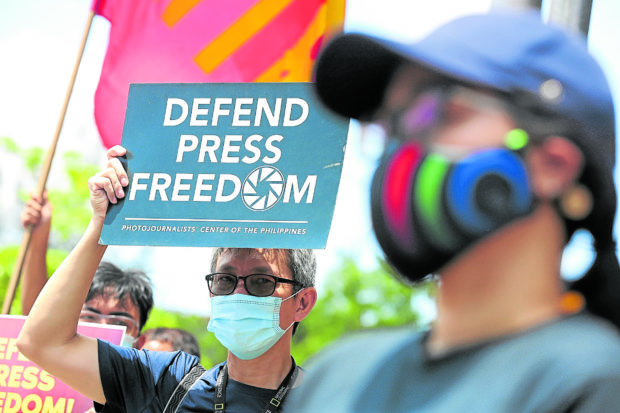
ASSEMBLY Supporters, employees and talents of ABS-CBN stage a march from the Commission on Human Rights to the House of Representatives in Quezon City, as they protest other related issues being raised against the Duterte administration. —INQUIRER/NIÑO JESUS ORBETA
MANILA, Philippines — Malacañang on Thursday downplayed the Philippines’ decline in ranking in the 2021 World Press Freedom Index, saying the country’s two-notch fall does not really mean anything.
The Philippines placed at 138th from 136th last year in the Paris-based Reporters Sans Frontière (RSF) or Reporters Without Borders.
“Unang-una, dalawang position lang po yan. Two positions lower. De minimis po yan, walang masyadong ibig sabihin,” presidential spokesperson Harry Roque said in an online briefing.
(First, that’s only two notches. Two positions lower. That’s de minimis, not much significance.)
Roque noted that the Philippines is still at the fourth spot among Southeast Asian countries and ahead of Myanmar, Cambodia, Brunei, Singapore, Laos and Vietnam.
The Palace official also disputed what were said to be reasons behind the Philippines’ decline in the report, which cited the persecution of media through judicial harassment as in the case of Rappler CEO Maria Ressa, Congress’ denial of fresh franchise for ABS-CBN, the rise of red-tagging, among others.
“We see nothing wrong with it (Reporters Without Borders report) pero of course we dispute also the ranking because yung Reporters Without Borders considered as affronts to press freedom itong Rappler issue na alam naman natin na nadesisyunan ng SEC [Securities and Exchange Commission], na hindi naman appointed ni Presidente Duterte at appointees ni Presidente Aquino pa; at saka itong ABS-CBN na alam na alam naman natin na kinakailangan ng prangkisa,” Roque said.
(We see nothing wrong with it but of course we dispute the ranking because Reporters without Borders considered as affronts to press freedom the Rappler issue which was decided by the SEC and not by an appointee of President Duterte, but of President Aquino; and the issue of ABS-CBN because we all know that a franchise is really needed to operate.)
“We also dispute that these two issues should not have led to our decline in our ranking,” he added.
ABS-CBN has been off the air since May 2020 after its legislative franchise expired. In July, its application for a new franchise was denied by a House of Representatives panel.
Rappler, meanwhile, was ordered shut by the SEC back in 2018 for “violating the constitutional and statutory Foreign Equity Restrictions in Mass Media enforceable through rules and laws within the mandate of the Commission.” The media outfit maintained it is 100 percent Filipino-owned and -controlled.
RELATED STORIES
As ‘main vaccine’ vs COVID fake news, journalism stymied in 170 countries
CHR: PH facing ‘a worse state of press freedom’